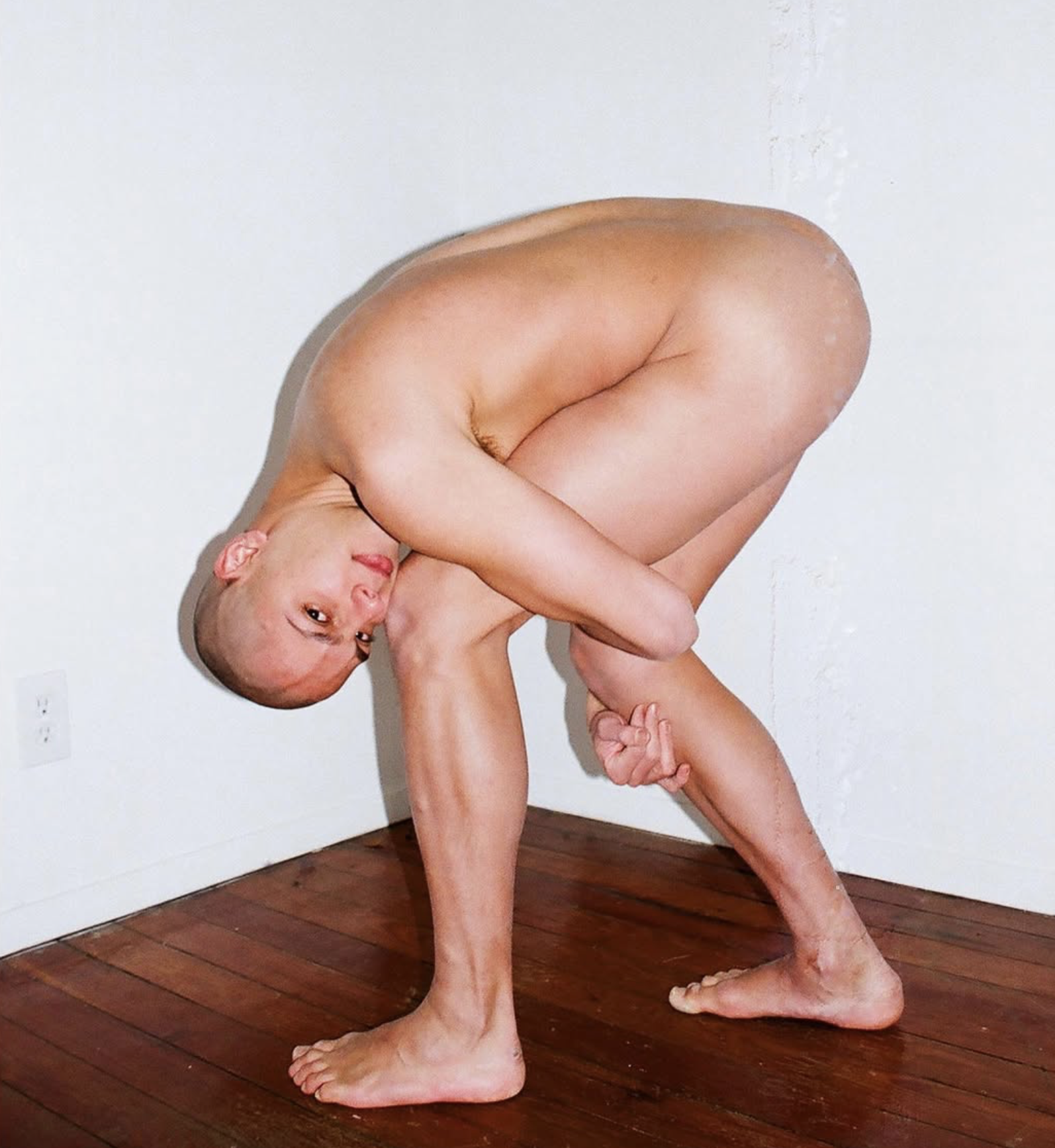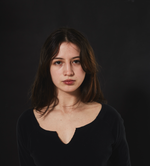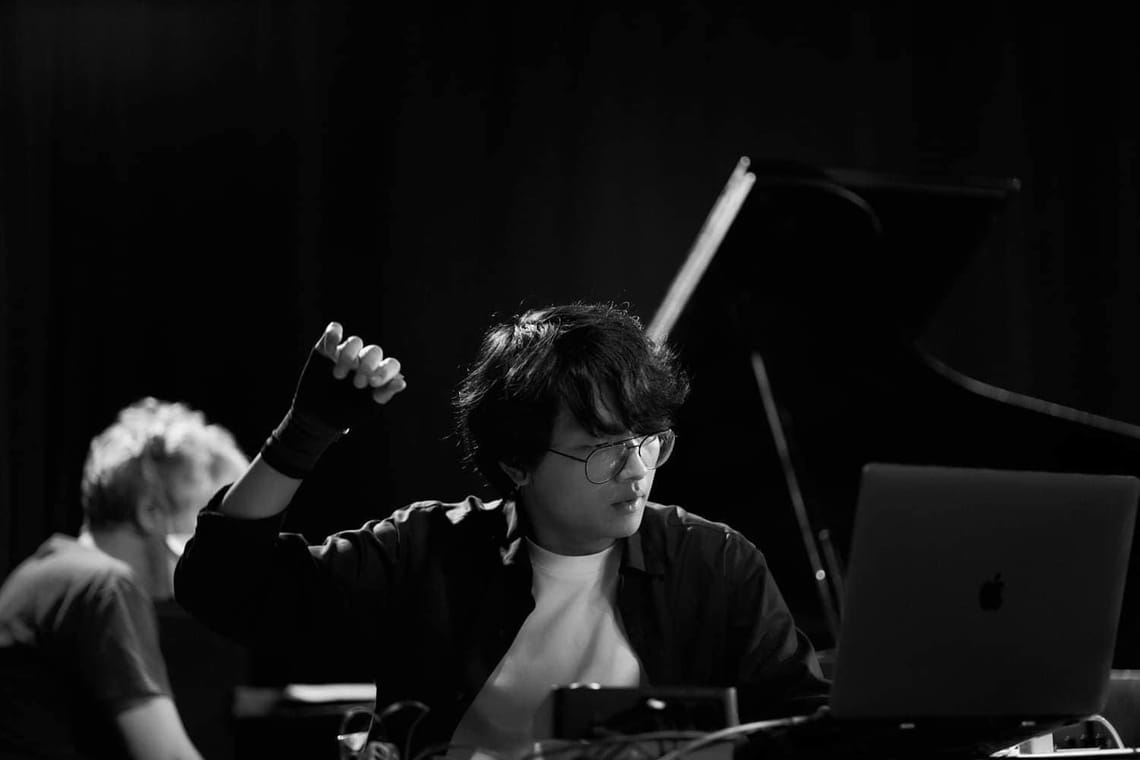On the windy evening of December 14th, 2024, I walked down the quiet, industrial neighborhood of East Williamsburg. Upon arriving at the telos.haus venue, I bumped into a friend, caught up with them a bit, before walking up the narrow flight of stairs to enter a wide, dark room illuminated solely by a red spotlight that was directed towards the makeshift stage. The spotlight flooded the rest of the venue with a maroon hue. I chatted with others, bought a Corona, and slowly made my way to sit on the floor in front of the blood red stage. There was a white pillar upstage left, a cello on upstage right, and a circular mirror propped up on a diagonal, center stage. A speaker was playing ambient, drone sounds that are difficult to describe.
Without announcement, 6 performers and a cellist walked out onto the stage. They arranged themselves within the space in still poses. One dancer was draped over the white pillar, another behind the mirror, gazing into it as if it were a stagnant pond. The dancers began to move, slowly shifting - no - growing, into new poses. The movement was so slow, it had a tableau quality to it. The staging, the set pieces, and the lighting also acted as the framing for this moving tableau. Watching the dancers seemingly glide from pose to pose felt very meditative. It was quite serene; however, there was also a sinister feeling in the room. It was as if there were a ghost in the room, looming over the space. As the dance progressed, a series of duets occurred, still maintaining this tableau quality while being incredibly bizarre in shape and every so often, changing tempo completely.
I met with choreographer, Demetris Charalambous, Deme for short, to discuss the creation of Late Matter
Iris Sewell: What was the main idea behind Late Matter?
Deme Charalambous: The idea initially came from the poem “God's List of Liquids” by Anne Carson and her interpretation of desire as a feeling and as a driving force. Desire is a very powerful feeling but it can also be this immature feeling and superficial feeling. There is this idea of the “death drive” and that humans are attracted to their own destruction… Desire can feel like an engine that leads someone to both pleasure and annihilation.
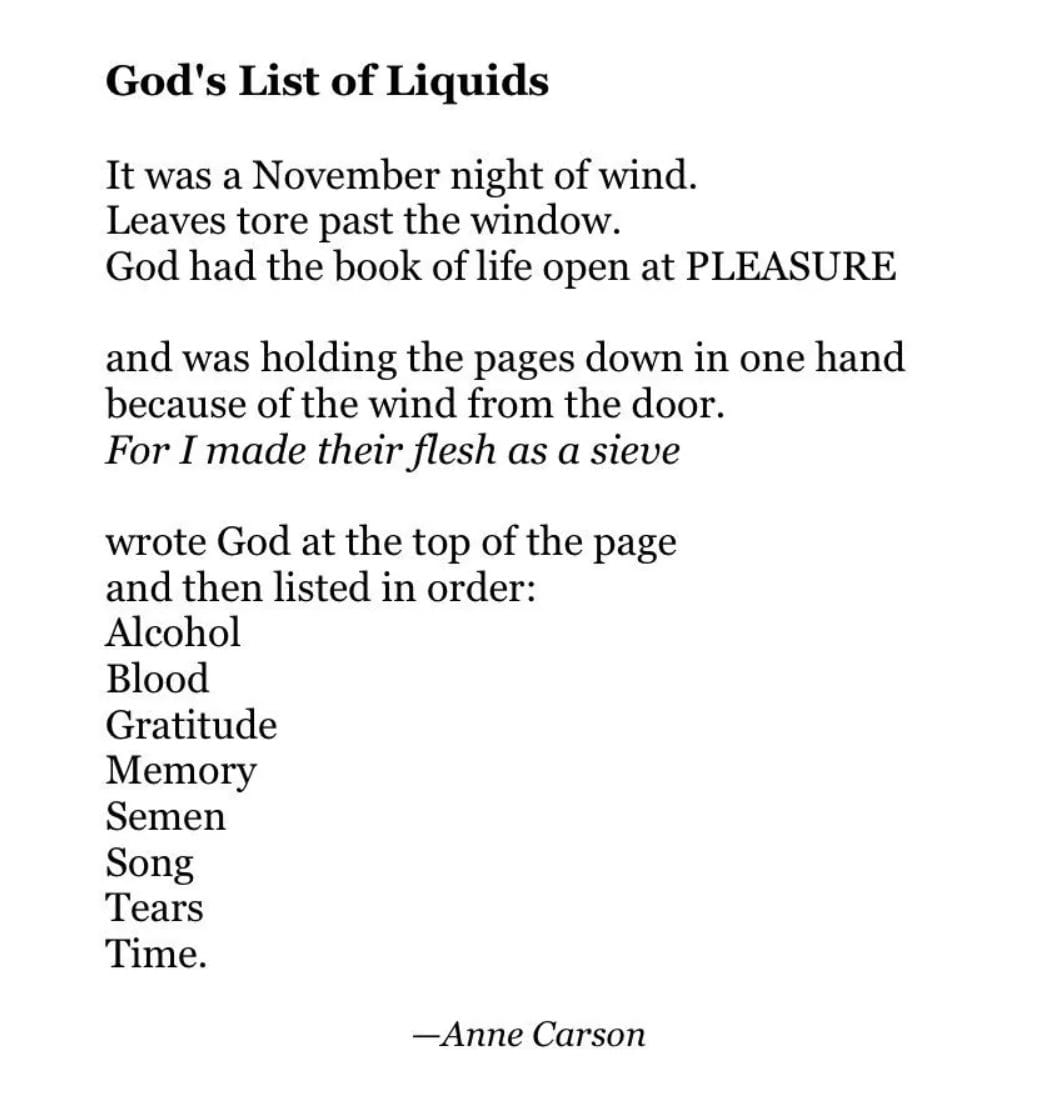
IS: How did you go about structuring the piece?
DC: (takes a pause)I initially got in the studio with my collaborators who I also credit as devisers of this work.
The cast and collaborators of Late Matter include Quique , Valentina Bache Rodriguez (VACA), Salma Kiuhan, Spencer Stroud, Channce Williams, and Marcela Torres. Deme also credits Alaia and Hudson Mona as collaborators of Late Matter.
I wanted to offer a space for my collaborators to explore a creative itch that the world I was offering to them elicited and simultaneously contextualizing their voice within the world I was directing. To start creating movement, each dancer was given a task as one of these “liquids”. Like for example, Spenser was alcohol and there was even this idea that he would take shots before going on stage… I think of their “characters” more as deities or gods. Thus, the pillar they rest on in the background. It was meant to allude to them being statues or totems… These characters exist on a red planet (referring to the red lighting) and are all experiencing a drought and they are trying to generate liquid. They are thirsty, they desire liquid.
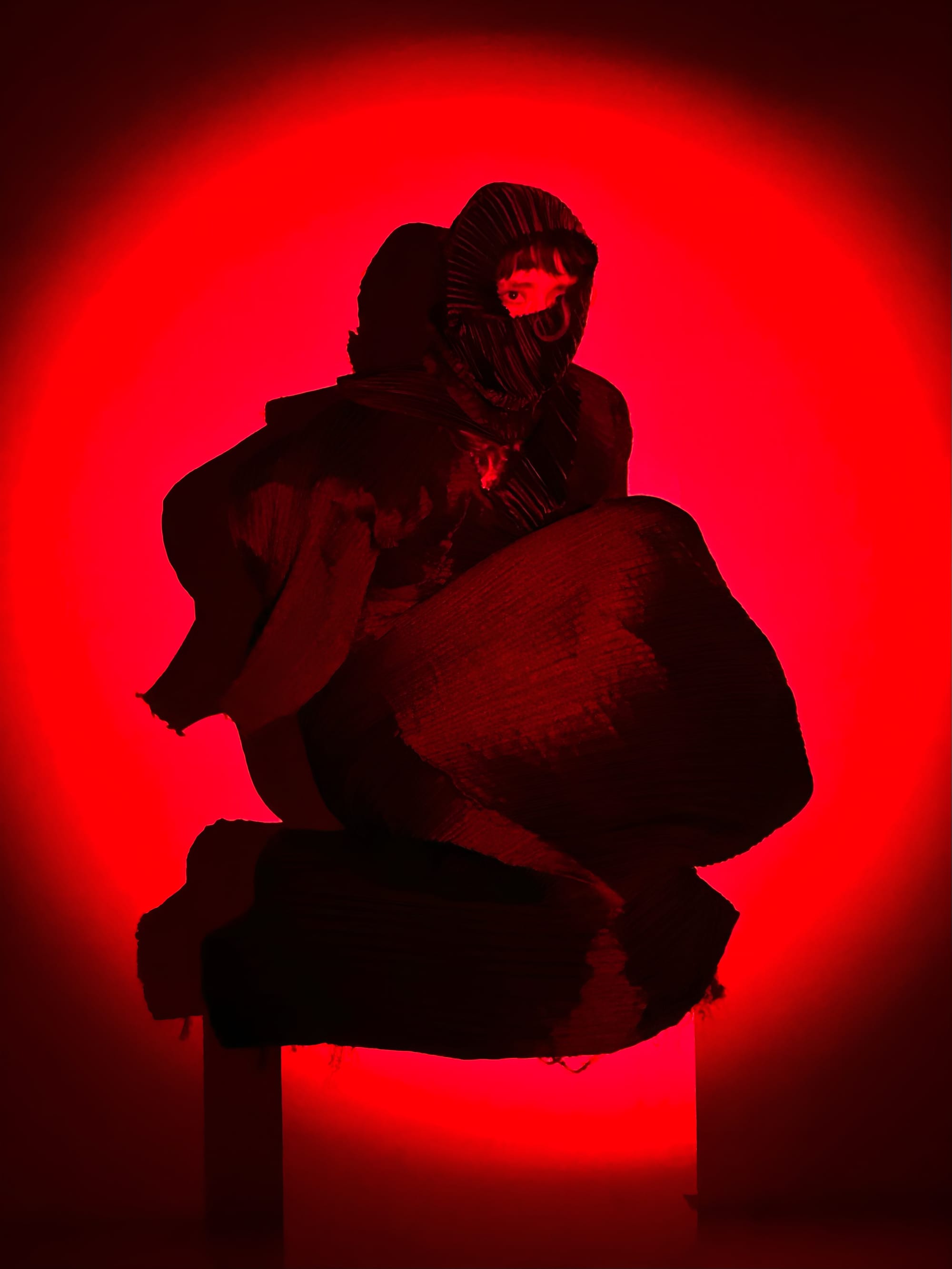
My character is a “timekeeper” being led through a red, drought-ridden world. I'm visiting all these pockets of this red world and encountering these entities, and one by one, I am defeating them.
The piece opens with Salma gazing into a mirror. The mirror acts as an object that makes the characters recognize something about themselves. I come by her side and bite into an apple, and then Salma notices herself. This is in reference to the fall from Eden… There is this giving into temptation and desire, and then there is this recognition of the body and its own mortality… We are losing all these heavenly privileges for something so cheap like desire.
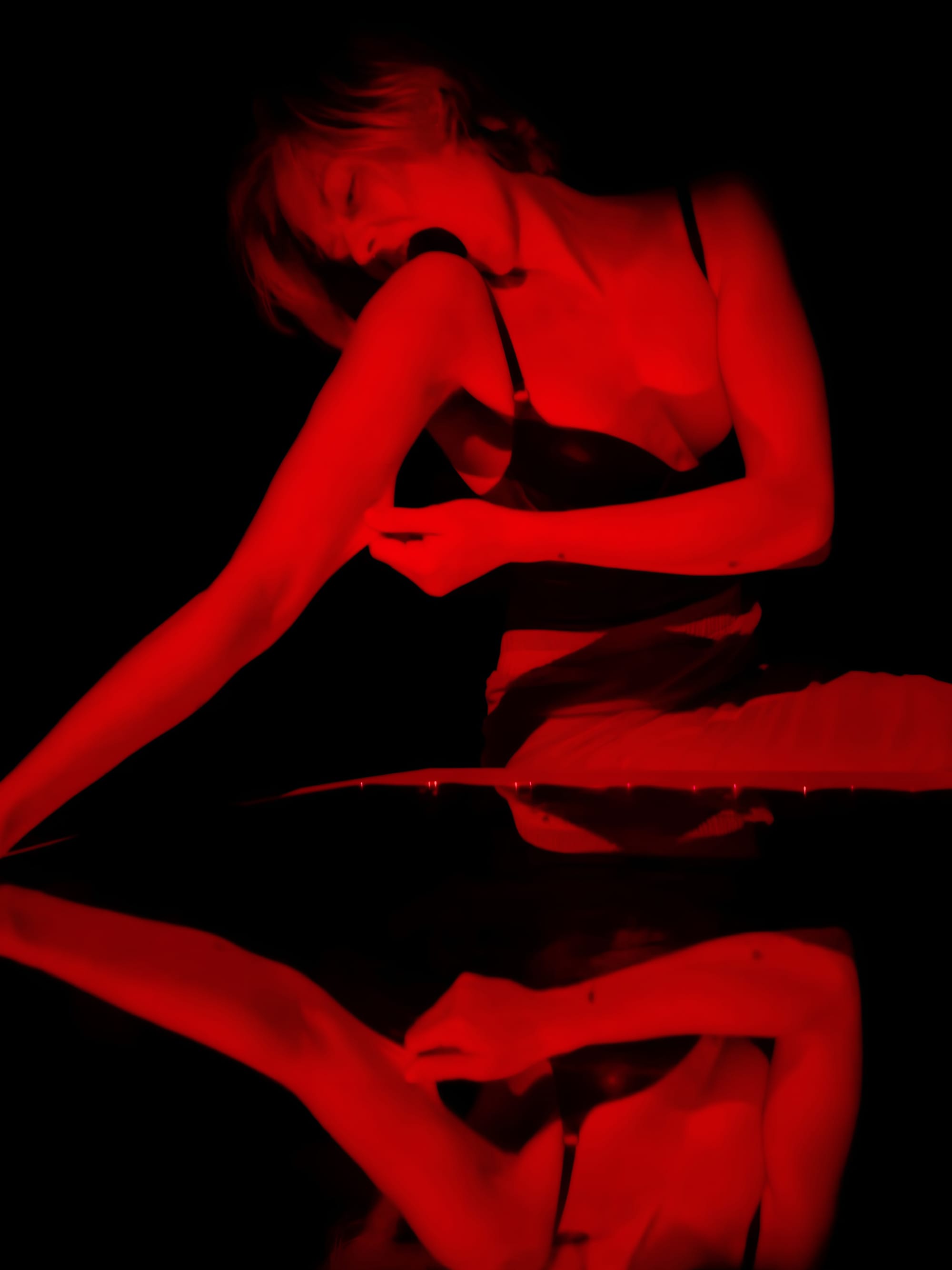
IS: Are you religious?
DC: No.
I do crave a system of faith though… I like the lessons… I am really interested in crafting my own cosmology… There is this element of being queer and kind of wanting to reinvent stories and myths that are closer to your experience… Also, I am from Cyprus and Cyprus has been under occupation for the past 60 years. I got into this question on what does a pre-occupational Cyprus look like and had come to realize that a lot of native stories and cosmologies are both a mixture of a plethora of neighboring cultures and also have been lost in time through centuries of colonization. Like many other countries, Christianity played a huge role in the erasure of ancient beliefs. There are totems that have been discovered. The main ones are a bull, a snake, and the goddess of fertility. There is a lack of access to archaeological sites because of the ongoing occupation. There are a lot of chunks missing… There is also this element of magic that is embedded into the fabric of Cypriot culture, such as evil eyes and pagan practices… So maybe I am crafting my own cosmology.
We laugh.
IS: Why the bold red lighting?
DC: For me, there has always been this idea of a terrible sun… a burning, scorching landscape. For the environment of this piece, I was thinking about August in Cyprus. I think growing up, August always felt like such a heartbreaking month. When everything was super hot. Like a screaming sun. I would go to the beach with my family and the heat would just be so depressing. Also… I think growing up there gave me a perpetual “summer heartbreak”. I feel like most people get seasonal depression in the winter but I think growing up, summer was always just such a painful experience for me. I don't know why.
IS: Do you still feel like that in the summer?
DC: No.
Late Matter was accompanied by a soundtrack and live cello performance composed by collaborator and romantic partner to Deme, Quique.
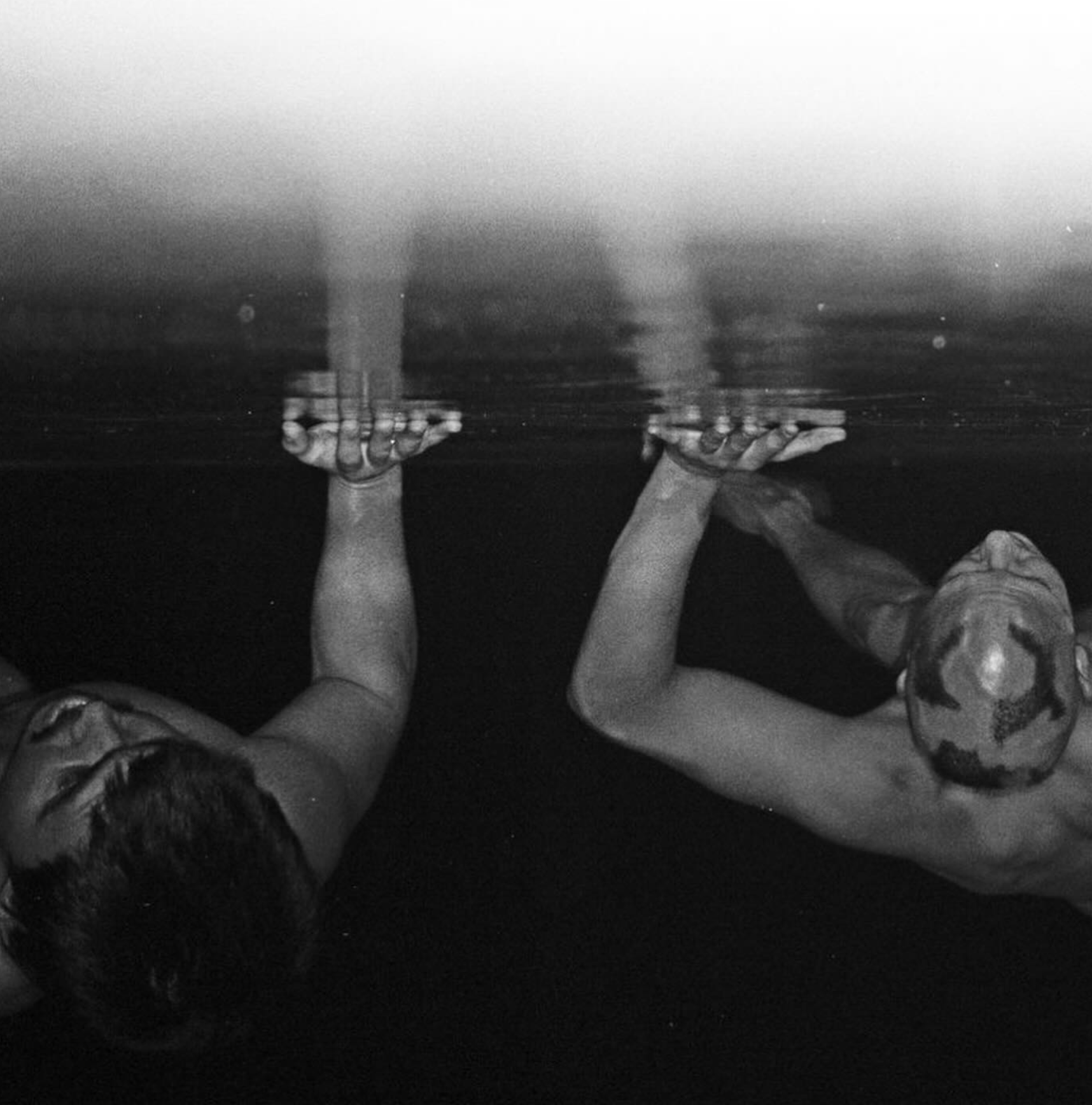
IS: So if all the dancers represent a different liquid and are all deities, is Quique also one of the deities?
DC: Yes.
Deme looks down at his phone, then looks back up
DC: Wow. That is so crazy. Right when you said “Quique” I got a message from them and I just see “Quique” on my screen.
Deme takes a deep breath in, seemingly composing himself from this cosmic pull.
DC: Yes, Quique is one of these deities… I made this with Quique. I conceptualized this with Quique. Quique was my sounding board. I couldn't have done this without Quique. Also they helped me carry all my shit in their car.
Quique's character is semen and song and tears. Their character is this deity that is a "match" for time (Deme being the Timekeeper). It can challenge time in a fair fight…
IS: At the end of the piece, after you spit on the mirror, there is a moment where the two of you have a solo. Quique is shoving the bow of their cello into your mouth while they continue to play… tell me more about that moment.
DC: That is definitely our moment. It is very, like, “life imitates art,” and it is very informed by our relationship. It became that this creature (the timekeeper) can only be contained by Quique. Quique is playing the solo and everyone else is on the side of the stage and become statues again.
After the December 14th showing of Late Matter, Deme brought friends who had viewed the piece onto the rooftop of telos.haus, along with the spit-covered mirror. That night was a full moon, and together, we all surrounded the mirror, gazed into the reflection of the full moon, and shared incense smoke and good thoughts. Deme reflects on this, saying:
DC: There is the aspect of dance being an ephemeral art form... How can we immortalize the body through performance?... Performance is a religious experience… Performance is pleasurable…I left it on there for months (referring to the spit stain on the mirror). That was my attempt at "there was this thing that came OUT of my body. This is the aftermath that became crystallized- that I could just have". I could give a more prolonged lifespan to the piece.
I hope that this interview also prolongs the lifespan of Late Matter.
Credits
Choreographer: Demetris Charalambous
Composer & Cellist: Quique
Performers & Collaborators: Valentina Bache Rodriguez (VACA), Salma Kiuhan, Spencer Stroud, Channce Williams, and Marcela Torres
Collaborators: Alaia and Hudson Mona
Cover photography: Acudus
Venue: tel.haus
Review of Late Matter
